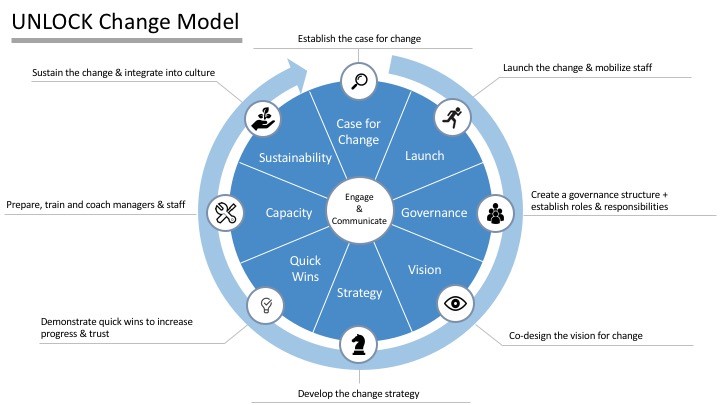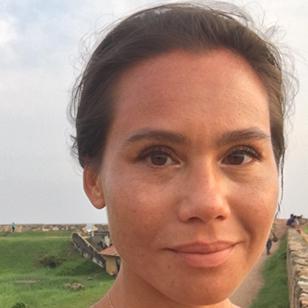Change Management at the UN and the UNLOCK change model
This year, the UN Secretary-General advanced an ambitious and wide-ranging reform agenda, which was adopted by Member States. The agenda aims to enhance the UN’s contribution to sustainable development, ensure more effective capacities to tackle conflict and sustain peace, and improve the UN’s internal management and ability to deliver.
The goals of the United Nations System Staff College (UNSSC) align closely with achieving the reforms. Especially relevant is the work of the UN Laboratory for Organizational Change and Knowledge (UNLOCK) - a programme of UNSSC in partnership with UNDP’s Management Consulting Team that promotes a culture of change and innovation in the UN system. UNLOCK’s learning offerings leverage the UNLOCK change model which serves as a guiding framework, makes sense of various change journeys and looks at applications of appropriate change practices in the different phases of transformation.
The UNLOCK change model
Change, at its most fundamental level, is about moving from a current state, through a transition state to arrive at a new future state, with the objective to improve the organization’s performance in some meaningful way. The UNLOCK change model walks through three stages of change with a focus on how to design, develop and deliver change in an organization. However, for change to be embraced and for impacted staff to adopt new mindsets and behaviors, the people side of change has to be thoughtfully managed because the technical solution is ultimately manifested in the behaviors, processes and day-to-day activities of staff in the organization. The UNLOCK change model provides a complimentary approach to classic project management. When applied in tandem, change management and project management provide a unified, structured approach to achieving organizational change.

“As the Director of a large Division, and a change management leader in the transformation of the translation services at the UN, I am always implementing change in iterations. Once one change is implemented, is time to move to the next challenge, while fine-tuning the previous one. Change is a cycle. I love the UNLOCK model, because it really represents what I am doing with my team.” (Cecilia Elizade, Director of the Documentation Division, DGACM, UNHQ)
Against the backdrop of the UN Secretary-General’s reform agenda, the second online edition of the ‘Introduction to Change Management’ learning programme - run by UNSSC in September - convened a diverse group of UN staff working on transformation processes ranging from project-level to organization wide changes in the field and at the UN Secretariat level, bringing to bear a remarkable depth and breadth of experiences from across the UN system. Participants spent five weeks learning about high-level systemic change and gaining a deeper understanding of the challenges of change, change leadership behaviors and competencies, but also how to set a vision, plan a change strategy as well as understanding, anticipating and mitigating the resistance which one may face as a change leader.
The Change House

While developing a compelling case for a better future and providing clear guidelines on how to get there, change leaders participating in the programme were less concerned about the mechanics of the change. Many spoke to the challenging aspect of effectively leading staff on the emotional journey and dealing with individual and collective fears around the impact of change initiatives. Using the ‘House of Change’ model - which describes the journey from contentment, transitioning through denial, confusion to renewal as a natural part of a change process. Reflecting through this model on their role of managers during change created an awareness of the psychological impact of change and gave ideas how to navigate the different stages, for oneself and others.
“While uncertainty can create a lot of negative tension, fear and drive some to disengage, it can also be the perfect moment to look for innovations and alternative solutions, which are in turn great opportunities to bring people together in cohesion.” (Sarah Wade-Appicella, Capacity development program management officer, UNISDR)
Communication and engagement
A common concern highlighted throughout the course was that change efforts have traditionally involved one-way, leader-driven communications that becomes lost in the high volume of unfiltered messages. Participants identified a common trap leaders fall into: to frame engagement as a communications issue. This is characterized by slick communication campaigns, including branded material on the walls and social media platforms. Ultimately, however, it feels hollow and does nothing to win hearts and minds. Focused engagement, which allows employees to co-create change alongside leaders, is critical for success.
The importance of meaningful engagement is particularly crucial for a global organization like the UN. Change agents can help coordinate these efforts and help staff use live-feedback tools to support and complement the movement of information from the top to the rest of the organization. More advanced digital communication tools such as crowdsourcing apps will be especially helpful in UN organizations that struggle to engage with the deep field and entities with many different sites or locations.
“Change will commonly be perceived differently at the Headquarters than at the field entities. From my latest experience with the project, we are very mindful of how the change will impact colleagues in the field and in fact one of the first deployments is geared for the Peacekeeping operations, tailoring the training and the hands-on budgeting preparations. For a global Organization like ours, it is crucial to maintain the global view.” (Kornelija Juskaite, Programme Management Officer, ERP-Umoja)
The next edition of our online ‘Introduction to Change Management’ is starting on 3 December 2018 and will run until 3 February 2019 with a break over the New Year. Please click here read more about the programme and sign up.
